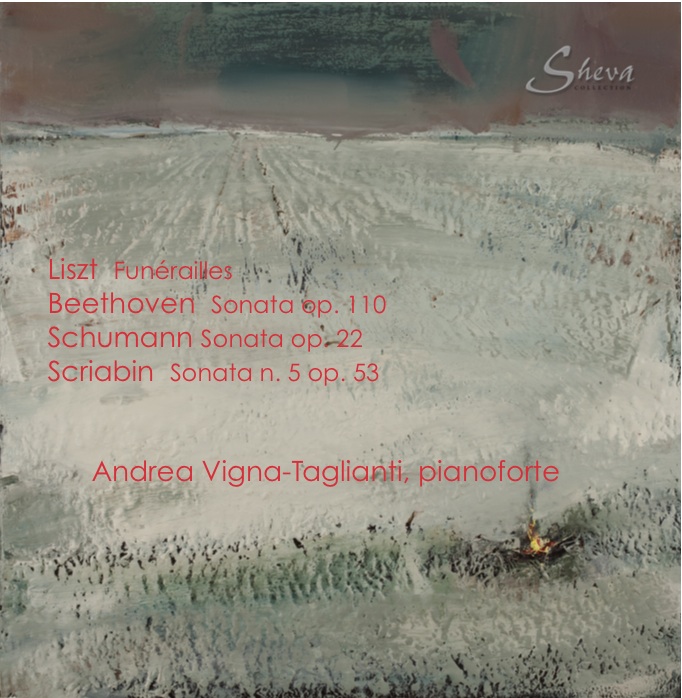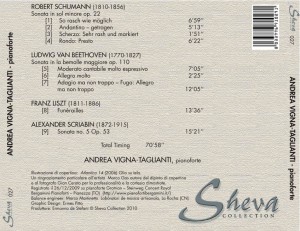Discography
Schumann, Beethoven, Liszt, Scriabin

Tracklist
Schumann: Sonata Op.22
Beethoven: Sonata Op.110
Liszt: Funérailles
Scriabin: Sonata Op.53
Further information
To buy the CD go to www.shevacollection.it
This cd is now available also on Naxos Music Library (www.naxosmusiclibrary.com)
Sheva’s cd are distributed by:
Reviews Beethoven, Liszt, Scriabin
15th of June 2020
Glasgow, UK
Beethoven no 21 in Ab Major op 110
I. Moderato cantabile molto espressivo (3/4)
Mr Taglianti’s interpretation has very good flow, excellent tempo, very good articulation, detailed and ample dynamics. Mr Taglianti explores the depth of the composition, without ever appearing too analytical. This is a very good, clear-cut interpretation.
II. Allegro molto (2/4)
Mr Taglianti’s rhythm here is absolutely clean, with drive, excellent articulation and phrasing. The sound is clear and transparent.
III. Adagio, ma non troppo (4/4) — Arioso dolente (12/16) — Fuga. Allegro, ma non troppo (6/8)
The introduction has a well-defined, good tempo and flexible overall, with the necessary character particularly in the recitativo part. Adagio — but non troppo, and with a definitive movement forward. A good tempo was also chosen in the Arioso dolente / Adagio ma non troppo part, playing with accurate, detailed, “speaking” dynamics. Mr Taglianti’s interpretation had very good dynamic differentiation between the voices in the fugue, very transparent. The transition back to the Arioso tempo is excellent / convincing, also the second Arioso is very expressive. The final Fugue and the Coda are excellent, with a touch on the “jazzy” side, but definitely with drive, enthralling. An excellent performance.
Mr Taglianti’s performance of Liszt’s Funerailles (No 7 from Harmonies Poetiques et Religieuses) was technically superb, played with security, verve, clarity and with an incredibly varied tonal grandeur. The ease with which Mr Taglianti peformed this difficult work assures us that there would be no challenges in any other repertoire that he would not easily meet. This performance was a wonderful display of technical mastery, a thorough understanding of the style of the work, impeccable rhythm and pedaling. The octave passages were stunning. The lyrical passages were performed with musical sensitivity, dynamic contrast, poise, and tonal variety required of this Romantic Style. So often, Liszt performances are noisy, and over-pedaled but Mr Taglianti’s playing is incredibly accurate and controlled, a fantastic performance!
Scriabin Sonata no 5 op 53
Sonata No. 5 is Scriabin’s first of ten sonatas to reflect a disposition and vision specific to him, jumpstarting Scriabin’s shift from stylistic imitation to his Scriabin-stamped creation. This sonata moves away from Scriabin’s old Romantic tendencies, fully embracing atonality, yet slightly clutching traditional harmony still, thereby bridging the tonal spectrum.
Mr Taglianti’s opening of this work was highly effective in his performance, pounding at the piano’s deep end, exuding insightful vibes from its first few measures. The crescendos of various lengths were beautifully controlled. Mr Taglianti’s stylish and spontaneous playing worked perfectly in the unstructured sections of the piece. Scriabin brings a lot of changes to the sections of this Sonata and there is so much new content in this work and Mr Taglianti’s playing captures their intensity by playing prior motifs with different expression.
Mr Taglianti’s performance was excellent, fascinating and highly interesting and presented both the richness and fine textures of this work. All the subtle details and rhythms were brought to light infusing us infusing us with Scriabin’s mysticism. Overall, a thoroughly entertaining performance!
Ancuta Nite-Doyle BMus, PGDip, MMus www.ancutanite.co.uk
Director Nite Piano School, Glasgow UK
Artistic Director Ardtornish Piano Retreat, Lochaline, UK
Piano Teacher University of St Andrews, UK https://www.st-andrews.ac.uk/
PTHP Lecturer in Piano Royal Conservatoire of Scotland https://www.rcs.ac.uk/

